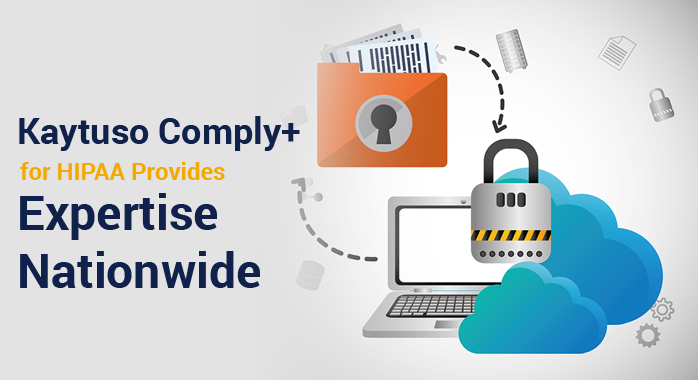Kaytuso: Comply+ for HIPAA - Designed for Healthcare Providers To Achieve and Maintain Complex Compliance Regulations Mandated By The Federal Government
Healthcare providers must maintain complete compliance with the Health Insurance Portability and Accountability Act (HIPAA), or else face disastrous fines and penalties. But the complex nature of the HIPAA regulation can make achieving — and maintaining — compliance difficult. Did you know that even a modest change to your systems or software can cause them to slip into non-compliance?
HIPAA’s complexity demands a level of proactivity and vigilance that most organizations are unable to achieve on their own. The best way to navigate the difficult road to HIPAA security with confidence is to find a trusted security and compliance partner, like Kaytuso. Our expert assistance will provide your organization with a reliable and comprehensive regulatory compliance solution, regardless of your size or goals.

Kaytuso: Comply+ For HIPAA Provides Expertise Nationwide
Kaytuso has been a trusted provider of HIPAA, HITECH, PCI-DSS, and other regulatory compliance services to healthcare providers across the country for over 20 years. Organizations trust Kaytuso because of its track record of providing comprehensive HIPAA compliance assessments and an established reputation for excellent customer service.
Strong HIPAA compliance is divided into five major categories, each of which the Kaytuso team will help you address with efficiency and certainty.
What is EPHI? The major focus of the HIPAA and HITECH regulations, is securing both electronic and paper personal health information, also known as EPHI and PHI.

Technical safeguards
The core of HIPAA is a rigorous set of technical controls and processes. We can help you decipher HIPAA's dense language and implement the full range of technical safeguards, which includes implementing centrally-managed data access controls, encryption and decryption of all ePHI, authentication and integrity controls, the creation of auditing trails, and much more.

Administrative safeguards
Regulations to ensure staff is properly observing HIPAA is another important aspect of strong compliance, accounting for over half of the regulation, requirements. A broad category of administrative controls include risk analysis and management, properly assigning security responsibilities, workforce management protocols, and more.

Physical safeguards
HIPAA demands that your office building and physical infrastructure is safe from tampering and intrusion. The Kaytuso team will prepare your organization for full HIPAA compliance by securing your office, server rooms, and workstations with today, best practices for physical security while also providing processes for the management, storage, and disposal of your network devices.

Organizational requirements
The requirements for HIPAA compliance do not simply stop at the healthcare provider. This section includes flow-down requirements for subcontractors, partners, and third-party service providers who may, during the course of their work, have access to protected health information.

Policies, procedures, and documentation requirements
As the regulatory governance laws are updated and amended, specific needs have changed as well. These policies and procedures cover the written and technical enforcement of updates, session time limits, and business continuity systems that ensure critical information is available when needed.
Kaytuso: Comply+ for HIPAA fills your resource gaps and helps you meet the challenge of non-stop healthcare operation.
- 24/7 Availability
- Ethical Hacking and Vulnerability Testing
- HIPAA Audit Assistance
- Remediation Planning and Resolution Services
- HIPAA Security Risk Analysis
- HIPAA Security Officer Service
Kaytuso: Comply+ for HIPAA begins with risk-based security

Gone are the days when HIPAA compliance meant simply running down a checklist, making sure each item was properly addressed and signing off on a system as compliant. Today, your IT infrastructure (especially your network) and the latest regulations are too complex to make that approach feasible.
The compliance community unanimously agrees that the best foundation for HIPAA compliance is a robust risk-based approach to security. Risk-based strategies identify your most sensitive data assets, locate the threats that pose the greatest danger to your network and data then directs the effort to mitigate those risks in order of their importance.
To achieve the strongest possible security, the Kaytuso team uses the National Institute for Standards and Technology (NIST) cybersecurity framework as a foundation for all security and HIPAA compliance programs. The NIST framework is recognized by governmental and non-governmental authorities as to the most comprehensive guideline for creating strong cyber defenses, and a highly effective foundation for HIPAA compliance.
The stages of the NIST cybersecurity framework lifecycle

Identify
Asset Management, Risk Management Strategy

Protect
Awareness Controls, Access Controls, Data Security

Detect
Anomaly and event detection, Proactive security monitoring

Respond
Response planning, Analysis, Mitigation

Recover
Recovery planning, Business continuity
Data Governance
The average healthcare organization is composed of many moving parts, including staff members, IT systems, third-party vendors, and more. That complexity demands a comprehensive set of policies and procedures for ensuring the quality and security of your ePHI data as it moves through your systems – a process known as data governance.
Some important aspects of data governance in the healthcare field include:
- ICD-9 to ICD-10 conversion
- Data availability management
- Metadata management
- Data quality management
Data governance facilitates strong analytics
Data governance doesn’t just serve a role in your HIPAA compliance program, it’s also a foundational part of many important next-generation IT functions, like data analytics and business intelligence. These applications rely on strong and effective policies to provide trustworthy input and output data.
Kaytuso prepares you for HIPAA compliance in the cloud
There are many good reasons for healthcare organizations to be excited about cloud computing, like low-cost, convenient data archiving, better communication between disparate IT systems, reduced infrastructure maintenance, and increased scalability.
But the cloud can also intensify your HIPAA compliance challenges. Which cloud vendors are HIPAA “business associates” and which aren’t? Is your network properly encrypting data that’s in transit to and from the cloud? Kaytuso’s experts will help you integrate on-premise and cloud applications to achieve HIPAA compliance and optimal productivity in one painless process.
We love helping healthcare organizations master cloud security and compliance

Deploy the latest cloud EHR solutions

Securely centralize health records in the cloud

Achieve comprehensive disaster recovery and business continuity

Remote Treatment and Telemedicine
Kaytuso makes full HIPAA compliance easy and effective
From its headquarters in New York C4 Kaytuso provides world-class regulatory compliance services to organizations nationwide in the healthcare field. Are you struggling to maintain full HIPAA compliance? Maybe you want to adopt a new application or platform, but aren’t sure how it will affect your HIPAA compliance needs?
No matter what your HIPAA challenges are – our team is ready with an answer and a solution. Contact us any time at or 212-792-9932 to speak with one of our experts; we’re always eager to help!
 I Need To Become Compliant
I Need To Become Compliant
